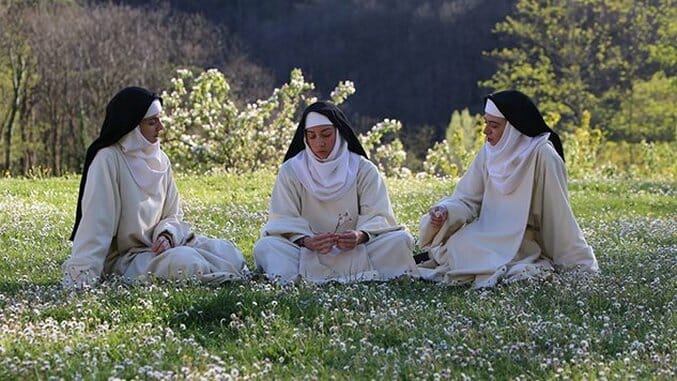The Little Hours

Raunchy comedies rarely cop to such well-regarded sources: The Little Hours claims its basis lies within Giovanni Boccaccio’s 14th-century novella collection The Decameron, which makes its structure, bawdiness and characterizations all feel appropriately pithy. A series of incidents involving three horny nuns—Alessandra, Genevra, and Fernanda (Alison Brie, Kate Micucci and Aubrey Plaza, respectively)—and sexy farmhand-on-the-run Massetto (played by Dave Franco in full romance novel cover mode), The Little Hours finds writer/director Jeff Baena (who minored in Medieval and Renaissance Studies at NYU) delighting in updating The Decameron’s light and witty stories, helped by the fact that Boccaccio’s language was opposed to the flowery erudition of most of the period’s texts. That translates to a very vulgar (and funny) movie both indebted to and different than a wide spectrum of vulgar nun and nunsploitation movies that have spanned porn, hauntings and thrillers promising both nude nuns and big guns.
Though the connective tissue keeping the film’s story together often requires its thin characters to improvise or otherwise overstretch themselves from sketch to sketch—emphasizing their relative shallowness as short story subjects—the medieval absurdity at the heart of the comedy always lands. Partially due to the care Baena takes to situate us in a very specific time period (the filming took place in real castles from the era and the score/costuming feels spot-on), and partially thanks to the comic chemistry between its cast, each vignette keeps the “swearing holy woman” gag fresh.
The Little Hours’ plot as a whole is instigated by Massetto’s unfortunate cuckolding of the blunt, boring and politically-minded Lord Bruno (Nick Offerman, somewhere between Ron Swanson and a Game of Thrones throne-chaser), followed by his escape to a convent. Once there, he must act deaf and dumb so there’s no fuss about the young stud—whose shirt is almost always open—hanging around a temptation-averse nunnery. (That the aversion was secretly perversion all along fits perfectly in line with contemporary culture’s views of religious oppression.) Criticizing the practices of the church and satirizing the practice of families donating daughters to convents in lieu of a tithe, the film always bows to its women, even at their most oppressed. Establishing historical (and, analogically, modern) constraints for these women happens quickly and naturally, allowing the nuns’ misbehavior to become an immediate punchline.
Alessandra is the spoiled newcomer, Genevra a sheltered believer, with Brie and (especially) Micucci bringing a raging energy to their roles, which is particularly impressive considering that all but their faces are hidden away by habits for most of the film. When Brie reveals her hair and her neck, it’s incredibly sexualized due entirely to the success of the film’s ascetic aesthetic.
-

-

-

-

-

-

-

-

-

-

-

-

-

-

-

-

-

-

-

-

-

-

-

-

-

-

-

-

-

-

-

-

-

-

-

-

-

-

-

-








































